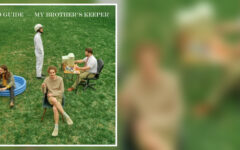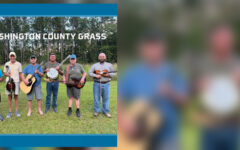
The Boston-based band Mile Twelve take inspiration from their allegories. Their name refers to a mile marker on their hometown’s southern parameter, while their sophomore set, City on a Hill, references the fact that Boston boasts a long held reputation as a city with a hallowed past.
It’s a credit to both their potential and their prowess that the group — David Benedict (mandolin), Catherine “BB” Bowness (banjo), Bronwyn Keith-Hynes (fiddle), Evan Murphy (guitar, lead vocals), and Nate Sabat (bass, lead vocals) — had achieved several accolades even before releasing their debut album, the aptly title Onwards, from 2017. Recipients of multiple IBMA Momentum Awards, they went on to receive additional nods the following year in the instrumental category as well as 2018 nominations in the Emerging Artist and Instrumental Performance of the Year categories as well.
The kudos are clearly well deserved. All the band members contribute to composing the material on the new album, save for an unusually rousing take on Richard Thompson’s otherwise somber ballad, Down Where the Drunkards Roll. Yet while the band sets themselves a high standard by choosing that track to open the album, each of the offerings that follow achieve the same high bar.
Whether it’s the rumination and reflection expressed in such songs as Where We Started, Journey’s End, and Good Times Every Night, the somber story of Jericho, or the celebratory sound in Liberty, there’s consistent craft and creativity expressed at every turn. So while there are serious sentiments expressed in each of their efforts, it’s the infectious melodies that attract the attention. Here agin, the band’s effusive performances — as demonstrated on such songs as Innocent Again and the rousing instrumental, Rialto, in particular — allow them to remain true to the traditional template without impeding their more melodic inclinations.
In fact, their ability to blend both those additives is aided and abetted by producer Bryan Sutton, a man who knows something about the ability to bend bluegrass boundaries as appropriate. As Sutton says in the liner notes, “I’m a fan of bands who strive for a balance of being musically unique and individualized, while at the same time working to include time-honored traditions found in this music.” The fact that he played a part in allowing Mile Twelve to achieve that distinction is clearly a credit to all involved.







